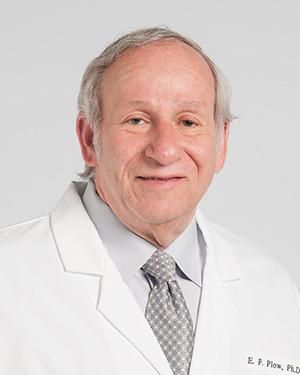Edward Plow Laboratory
-
Edward Plow Laboratory
- Principal Investigator
- Research
- Our Team
- Publications
- Careers
- Research News
Research
Biography
Education & Professional Highlights
Research
Integrins are a large and broadly distributed family of adhesion receptors. Each member is a noncovalent heterodimer composed of an alpha and a beta subunit. The key to the many functions of integrins is their capacity to rapidly modulate their affinity for ligands, to recognize multiple and structurally unrelated ligands, to engage these ligands in a divalention-dependent manner, and mediate intracellular signaling events. Development of a molecular understanding of these central properties of integrins is a major goal of the laboratory. Mutagenesis, expression, biophysical, immunochemical and functional analyses are employed in our studies. Integrins of particular interest are alphaMbeta2, which plays a pivotal role in leukocyte responses during inflammation, and alphaIIbbeta3, which mediates platelet aggregation. Plasminogen is the precursor of the proteolytic enzyme plasmin. In addition to its central role in fibrinolysis, plasmin(ogen) is also involved in cell migration, a function that depends on plasminogen receptors on the surfaces of cells. Ex vivo and in vivo analyses are being performed to determine the roles of plasminogen and its receptors in inflammatory responses.
Our Team
Selected Publications
- Das R, Ganapathy S, Settle M, Plow EF. Plasminogen promotes macrophage phagocytosis in mice. Blood. 2014 Jul 31;124(5):679-88. PMCID: PMC4118484
- Sossey-Alaoui K, Pluskota E, Davuluri G, Bialkowska K, Das M, Szpak D, Lindner DJ, Downs-Kelly E, Thompson CL, Plow EF. Kindlin-3 enhances breast cancer progression and metastasis by activating Twist-mediated angiogenesis. FASEB J. 2014 May;28(5):2260-71. PMCID: PMC3986835
- Pluskota E, Ma Y, Bledzka KM, Bialkowska K, Soloviev DA, Szpak D, Podrez EA, Fox PL, Hazen SL, Dowling JJ, Ma YQ, Plow EF. Kindlin-2 regulates hemostasis by controlling endothelial cell-surface expression of ADP/AMP catabolic enzymes via a clathrin-dependent mechanism. Blood. 2013 Oct 3;122(14):2491-9. PMCID: PMC3790514
- Bledzka K, Smyth SS, Plow EF. Integrin αIIbβ3: from discovery to efficacious therapeutic target. Circ Res. 2013 Apr 12;112(8):1189-200. PMCID: PMC3711133
- Das R, Ganapathy S, Mahabeleshwar GH, Drumm C, Febbraio M, Jain MK, Plow EF. Macrophage gene expression and foam cell formation are regulated by plasminogen. Circulation. 2013 Mar 19;127(11):1209-18, e1-16. PMCID: PMC3638243
Careers
Training at Lerner Research Institute
Our education and training programs offer hands-on experience at one of the nationʼs top hospitals. Travel, publish in high impact journals and collaborate with investigators to solve real-world biomedical research questions.
Learn MoreResearch News

Dr. Plow is the program director for a recently awarded program project grant from the National Institutes of Health that will enable research into the function of integrins in blood and vascular cells, and how their interactions with other proteins may drive disease.

The new grant will build on earlier work that shows elevated levels of a protein called WAVE3 in TNBC tumors.
